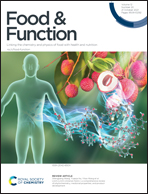Aspartame and sucralose extend the lifespan and improve the health status of C. elegans
Abstract
Aspartame (ASP) and sucralose (SUC) are non-nutritive sweeteners which are widely consumed worldwide. They are considered safe for human consumption, but their effects on certain physiological aspects, such as the lifespan or health status, of the organism have not yet been studied in depth and only limited data are available in the literature. The objectives of this study were to evaluate the effects of ASP and SUC on the lifespan and health indexes using Caenorhabditis elegans (C. elegans) as a model system. Interestingly, it was shown that at the concentrations tested, ASP (0.03–3 mg mL−1) showed an increasing trend of the mean lifespan of C. elegans, with a significant increase of 27.6% compared to the control at 3 mg mL−1. Similarly, SUC (ranging from 0.03 to 10 mg mL−1) also significantly increased the mean lifespan by 20.3% and 22.3% at 0.03 and 0.3 mg mL−1, respectively. However, 10 mg mL−1 SUC had a negative effect on the lifespan, though it did not reach a statistically significant level. In addition, ASP and SUC decreased lipofuscin accumulation and transiently improved motility, indicating improved health status. Nonetheless, they had different effects on food intake and intestinal fat deposition (IFD) at different intervals of time. Taken together, our findings revealed that ASP and SUC can prolong the lifespan and improve the health status of C. elegans.



 Please wait while we load your content...
Please wait while we load your content...